They live on the road under a temporary, plastic roof. But, for 11 days, Lord Ganesha finds a home in their abode, discovers Sonil Dedhia/Rediff.com.
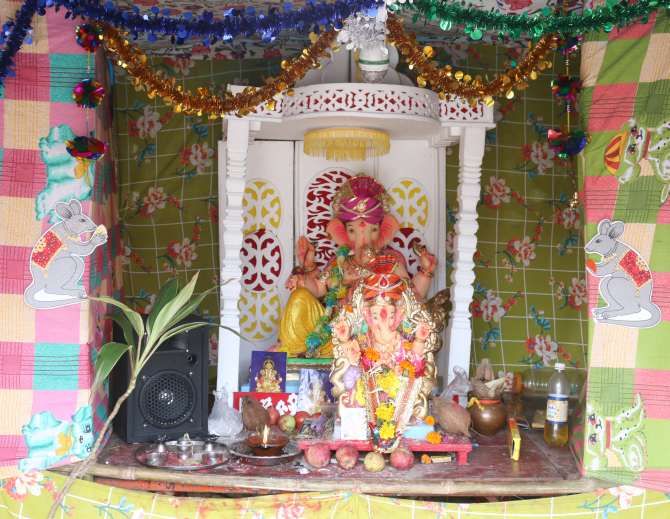
The sun is ready to set but the street that faces Mahim railway station in central Mumbai is bursting with people, sounds and vibrant colours.
Open-topped tempos and trucks zip through, and the young men standing in them whistle and cheer as they bid farewell to the elephant-headed God Ganesha.
September 6 was the one of the auspicious occasions for visarjan (immersion), marking nine days since the Ganesh Chaturthi festival began.
This road, that faces the railway station and leads to St Michael Church, Mahim, is home to a few families who eke out a living weaving bamboo baskets.
They don't have a permanent address. Their only shelter from the elements is are tarpaulin and sundry plastic sheets stretched across bamboo poles to form a roof.
They work here, cook here, eat here and sleep here. Some of the children run around naked; other wear just shorts or an underwear; a few are fully clothed.
Most babies sleep in makeshift cradles created with a bedsheet or a dupatta (shawl); the luckier ones snooze inside a cradle covered with a mosquito net.
Yet, none of the challenges that life has thrown at them diminishes the joy and fervour with which they bring home Lord Ganesha and celebrate the Ganpati festival.
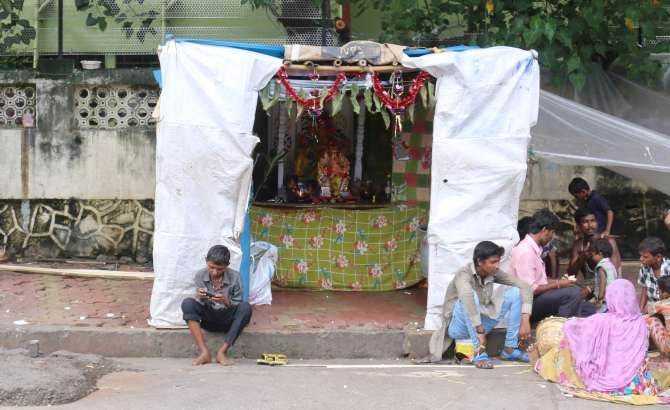
The area that has been reserved for Lord Ganesha is makeshift, and has been created using bamboo poles and plastic sheets. The murti (idol) is housed in a beautifully decorated thermacol temple; printed bedsheets and ribbons form the backdrop.
The festival has woven its magic as the children rejoice, celebrate and make merry; the road is their playground as they get together for an impromptu game of football or cricket or just tease each other.
"We have been bringing Lord Ganpati home for the last eight years. We can go hungry for 11 days, but it is mandatory to bring Him home. It’s a very momentous occasion for us," says 30-year-old Bansi, one of the eldest members in the family, with pride.
Thirty-year-old Bansi has a vibrant personality. He is dressed in a torn ganji (vest), has tobacco-stained teeth and his name tattooed on his arm. It has been a while since a comb has tackled his messed-up hair. He has been staying on the pavement for as long as he can remember.
Married nine years ago, he is the family’s breadwinner. After his father's illness left him unable to work, Bansi has taken to weaving cane baskets.
He children -- Badal (8) and Simran (6) -- study at a nearby school. "I couldn't study because my father didn't have the money, but I will make sure that my children are educated," he says confidently.
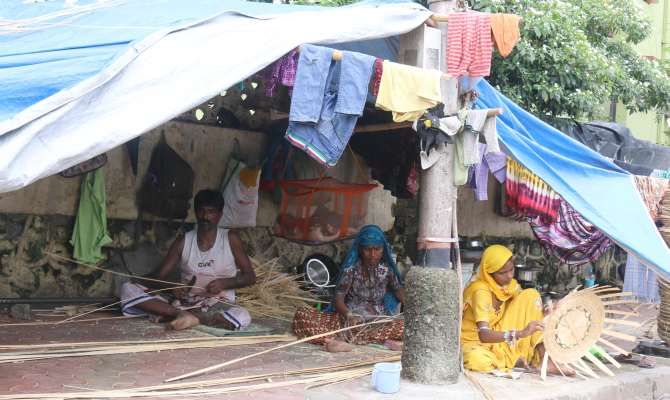
Bansi and his extended family, who originally belonged to Mount Abu in Rajasthan, are today part of Mumbai’s floating, faceless population of homeless people.
They all weave cane baskets for a living. "We make around 100 baskets every day," he says; his eyes suddenly dull with despondency. "We collectively earn around Rs 500-700 a day."
Though finance is a big issue, it doesn't deter them from bringing Lord Ganesha home. "Paisa thodi Bhagwan se bada hai. Uski meherbani se paisa jama ho jata hai (Money is not bigger than God. With His blessings, we manage to collect the necessary amount)," Bansi says, pointing towards Lord Ganesha's murti.
"We ask nearby shops to donate. We accept whatever they give us. The rest of the expenses are taken care by us. We try and save all through the year to celebrate Ganesh Chaturthi," he adds.
Pointing towards a wire, Bansi says they steal power from the nearest lamp post for the lavish illumination, "Ab humko kaun bijli dega? Gyarah din ke liye yahan se connection kar lete hai. (Who will give us electricity? We take the connection from here for 11 days.)"
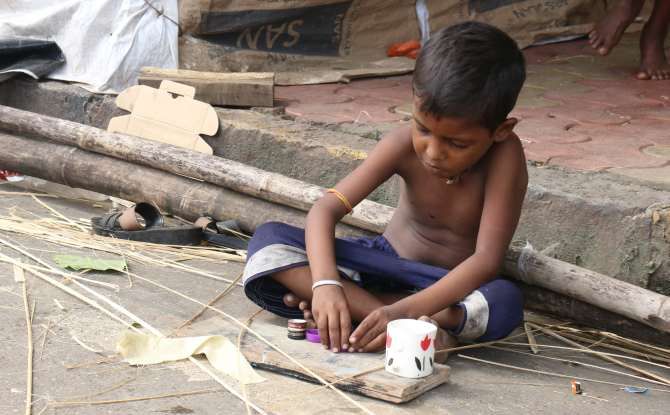
Several of Bansi's friends are present to take care of the Lord. "We take turns to sit besides Lord Ganpati and make sure everything is in order. It is a spiritual experience to serve the Lord," he says.
On most days, the family has a humble meal of dal (lentil gravy), rice and some vegetables but the 11 days of the festival are like a feast. "We try and make something sweet everyday and we first serve it to Lord Ganpati," says Bansi, lighting up a bidi (handrolled Indian cigarette where the tobacco is wrapped in a dried tendu leaf).
Over time, the family has increased, and they have spread out on the pavement. But staying on the road isn't easy.
The biggest problem they face is from the Brihanmumbai Muncipal Corporation. “Many times, they come and destroy everything. Another problem we face is sanitation. There are no public toilets and water taps so we use the railway tracks across the road for bathing and washing clothes,” he says.
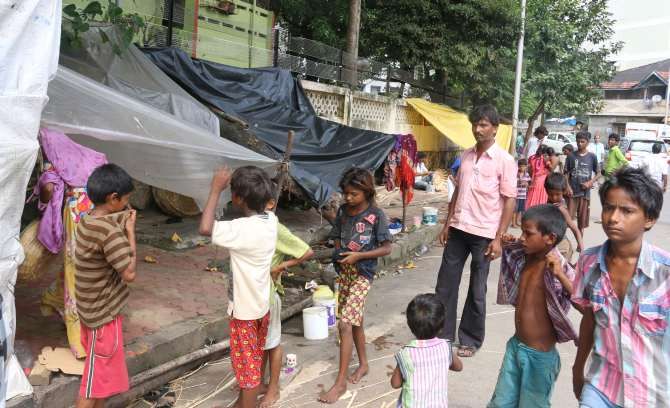
Thefts, pick-pocketing and fights are also are common. "Chori aur mara-mari hoti rehti hai; uska koi upay nahi hai. Police bhi aati hai aur kaafi time marte bhi hai (Thieving and fights are common; there is no solution to that. The cops also chase us and often beat us up),” says Bansi, showing one of his bruises from such an encounter.
The local people too are hostile towards the pavement dwellers.
According to Bansi, "These people think that we are drug addicts and criminals. Hum log saaf insaan hai. Kisi ko maarege ya chori karege toh Bhagwan humko maaf nahi karege. (We are clean people. God won’t forgive us if we kill anyone or steal from anyone.) ”
Asked if he has considered moving to a better place that could be a permanent residence, he smiles, "It is difficult to find a permanent place. Also, the baskets we weave are from bamboos which are 12 feet in length. I don’t think we can find such a big place. For us, this is our palace."
Photographs: Sonil Dedhia/Rediff.com
DON'T MISS!
Day 1: Ganpati Bappa Morya! Bringing the Lord home
Day 2: Mumbaicha Raja and a sea of devotees
Day 3: Goodbye Ganesha… it's not easy to let You go
Day 4: The Ganeshotsav festival's biggest tragedy!
Day 5: 'It was pure love for the Lord'
Day 6: Why Mumbai visarjans are so orderly
Day 7: This Ganpati is edible, so nothing goes waste
Day 8: Mangala Gauri: The 'Women's Only' Festival
Day 9: Band, Baaja, Bappa: It's a grand farewell party











 © 2025
© 2025